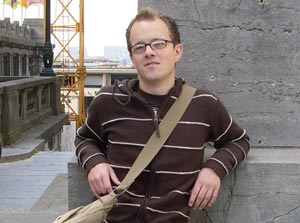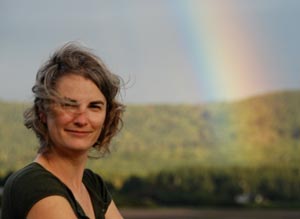 |
| Danny Jacobs is a poet and master's student in Library and Information Studies. (Photo supplied) |
"The easy answer is, that as writers, we all need jobs," says the poet Danny Jacobs. "I can’t make any money writing poems. So, you know, I want to be around things I love, which are books, and that’s the long and short of it."
That’s why he wants to be a librarian. Mr. Jacobs, and his colleague Nicole Dixon, come from a practical bread and roses school of thought where you seek a profession to support your vocation.
They are in the final year of their Masters of Library and Information Studies here at Dal and, while their future jobs may rest in libraries, their present vocations are literary. On Thursday, they’ll read poems and stories in the Rare Books Room of the Killam Memorial Library.
|
Librarian-writers are not new. The profession has a long history of writers moonlighting as librarians: Jorge Luis Borges, Archibald MacLeish, Thomas Berger and Philip Larkin, to name a few.
"Oh yeah," Ms. Jacobs exclaims, "Larkin, the great librarian poet! He worked in libraries back in the days when libraries were still libraries. Now libraries are not libraries and that’s what’s such a huge thing for us to learn. We’re not librarians, we’re information managers. I don’t think someone like Philip Larkin could relate to what’s going on at all."
That’s not a yearning for the past as much as an awareness of how different the world is now. The students Jacobs seem to enjoy the idea of rummaging through their métier to find its untapped poetry.
 |
| Poet Nicole Dixon has a forthcoming collection called High-Water Mark. |
"There’s a lot of terminology that’s really fascinating," says Ms. Dixon. "It would be interesting to work with that terminology in poetry. Things like ‘controlled vocabulary’ and ‘datasets’ and all these kinds of crazy words we are constantly bombarded with."
"I don’t think there’s a lot of writing out there about technology in the world," she continues. "There is, but it tends to be science fiction. Why not? We are all so technological, and yet, it’s so often not in writing."
"There’s interesting poems buried somewhere that could be dug up," Mr. Jacobs agrees, while admitting to a love of scanning through scientific dictionaries looking for "poetic words."
If libraries have come a long way from the days of tweedy poet-librarians, they both see Canadian literature on track towards a new voice, too.
A lot of mainstream Canadian literature, Ms. Dixon feels "is pretty crappy. It’s really past-obsessed, it doesn’t connect with ordinary Canadians. It often takes place in rural communities, but those rural communities are not rendered correctly."
She spent eight years teaching elementary school in rural Nova Scotia. In her fiction, there is no nostalgia attached to rural life. When she reads her story "High-Water Mark" to classes at Dal she says, "I always have young women come up to me and say, "Thanks, You got it."
Likewise, Mr. Jacobs sees Canadian poetry energized by younger poets taking language in new directions. "It’s not just someone staring at a field. It’s really interesting language, it’s exploring how we can change our writing."
What’s great about a reading, Mr. Jacobs says, is the music. "People, when they read poetry, they are so obsessed with figuring out what it means that they sometimes lose the music. Which is the destruction of poetry to me if you don’t hear the music and sounds."
They will be reading Thursday, September 30, 7:30 p.m. in the Special Collections Reading Room on the 5th floor of the Killam Library. Call 494-3615 for more information.
SEE: The LibVine
